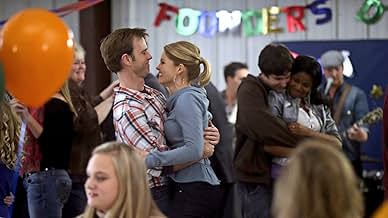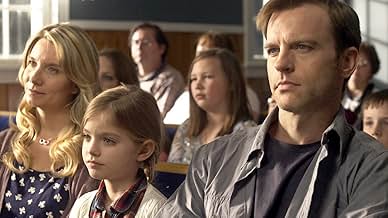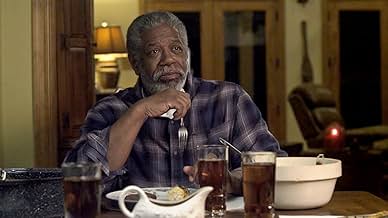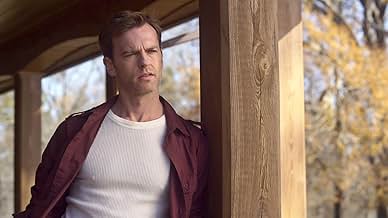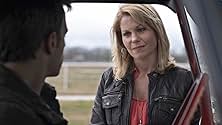The only thing standing between Dr. Lisa Leland (Candace Cameron Bure) and her dream wedding in the Hamptons is a 2600-mile drive from Los Angeles to Long Island. But a run-in with the law i... Read allThe only thing standing between Dr. Lisa Leland (Candace Cameron Bure) and her dream wedding in the Hamptons is a 2600-mile drive from Los Angeles to Long Island. But a run-in with the law in the country town of Normal, Louisiana leaves Lisa with a choice: jail or community servi... Read allThe only thing standing between Dr. Lisa Leland (Candace Cameron Bure) and her dream wedding in the Hamptons is a 2600-mile drive from Los Angeles to Long Island. But a run-in with the law in the country town of Normal, Louisiana leaves Lisa with a choice: jail or community service. Sentenced to three days as the town's doctor, Lisa soon finds her world turned upside-... Read all
- Director
- Writers
- Stars
- Mandy
- (as Valerie Boucvalt)
- Judge Denton
- (as Big Jim Elliot)
- Delia Wood
- (as Mary Thoma)
- Maria
- (as Delia Cobos)
- ACLU Attorney
- (uncredited)
- Director
- Writers
- All cast & crew
- Production, box office & more at IMDbPro
Featured reviews
Basically, the film follows a "big city" doctor who learns to love "small town" living. To be fair, the broad-based "city vs. country" stereotypes used in the film are nothing new. In fact the basic storyline is similar to Doc Hollywood (1991).
People who live in the "big city" are generally depicted as being cynical, snobbish, no-good folk who do not regularly attend church and (gasp) may even support the ACLU.
Rural people, in contrast, are generally depicted as being friendly, quaint, authentic, hardworking, decent folk who regularly go to church and believe that the greatest threat to America is the ACLU.
Yes, this TV-Movie did not invent these cultural, geographic and political stereotypes, but they certainly do not help the audience care about the characters.
Anyways, so the "big city" doctor needs to do a bit of community service in a Southern small town. To the film's credit, the town is not racially segregated....Although the film does seem to borrow a bit from Andy Griffith Show.
"Doc Shelby" -- one of the main actors in the film is arguable the best character -- in terms of development, acting and writing. You really do believe that his character plays a leadership role in the community and, faced with his own mortality, wants to make sure that the town will not be without a doctor.
Most of the other characters rarely move outside of the "big city" and "country bumpkin" stereotypes.
This is probably why one of the funniest lines in the film is when it gives characters lines, which are critical of judgmental people and stereotypes. It occurs early on in the film, when the "big city" doctor sits down for dinner and, yeah the irony is just hilarious.
In terms of its religious and political viewpoints, the film waits awhile to hit the audience over the head with them.
In fact, Netflix did include film in their "faith and spirituality" genre, which may have caused the film to be seen by audience members who are not fond of conservative politics or the religious right.
Yet, the message in the film gradually becomes clear; the "big city" doctor needs to be "saved" from the evils of big city life. How will this occur? If you did not know that this film was designed for a (conservative) Christian audience, then the right-wing hole that the film digs itself into may be hard to stomach.
Everyone in the town assumes that the "big city" doctor is nominally Christian and have nothing with expecting her to attend church as part of her community service.
The main "hot button" story line element has the small town fighting against the evil ACLU, in order to keep a Christian cross on public land.
The complex issue of religious freedom and church-state separation is basically reduced to an accusation that anyone who does not agree with the cross being on public land -- by itself -- is unAmerican tyrannt.
Granted, if you are a conservative Christian who shares the belief that religious freedom should only apply to your church, then the film's weak efforts at a "court room" drama may appeal to you.
Probably the biggest problem with the film is that nothing really major happens -- in three short days -- to explain the huge -- almost absurd -- shift in the "big city" doctor's personality and values.
Beyond the legal dispute, the big city doctor saves the life of a young girl and plays phone tag with her big city finance.
The problem is that we already know that the big city doctor is quite good at being a doctor. While she does, rather quickly, fall in love with a local boy, that is not really enough to explain the radical shift in her personality and values.
In the end she ditches her big city finance -- who may or may not be a stereotypical, big city, ethnically-ambiguous, non-Christian character (read Jewish).
No doubt the finance is more concerned with his career then the woman he loves, but so to is the woman herself.
The problem is that the woman goes from an Independent career gal, to the type of women who believe that women should be less focused on their career and more focused on being a good and obedient wife.
It is a pretty significant change, which is never really explained or justify in the film.
he only thing standing between Dr. Lisa Leland (Candice Cameron Bure) and the wedding of her dreams in the Hamptons is a 2600-mile drive from Los Angeles to Long Island.
What a pleasant surprise this was. I think it's impossible to dislike Candace Cameron Bure unless you have some serious personality issues. She's likable, pretty, and endearing. The supporting cast is good, too. A lot of times in these types of TV movies, you have a couple of recognizable leads and then a bunch of bland Canadians (I kid, I kid) filling out the rest of the cast. But here the cast is full of personable actors. Lou Beatty, Jr. is a standout and nearly steals the movie. The sheriff's deputy and the little girl are also very nice. My only real problem with the cast is Trevor St. John playing the small town guy Candace's big city doctor is inevitably supposed to fall for. For starters, his accent is a bit much. Everybody in the town has a Southern accent but this guy is full-on Gomer with it. Also, his character is kind of a jerk from the moment we first meet him. Throughout most of the movie, there's this condescending air about him that I didn't quite like. Nice kiss at the end with Candace, though. Pretty hot for this type of movie, I gotta admit.
As others have pointed out, the story is similar to the Michael J. Fox movie Doc Hollywood. Although Candace does very little doctoring, really. There are some plot gremlins, as well. For one thing, she has to stay in the town to serve out her sentence because they don't accept credit or debit cards (really?) and the town's only ATM is broken. Also, she apparently has no checks because "where I come from we don't use those." Well this is all just contrived silliness. She could probably call her bank and have the money transferred or any other of a half-dozen solutions that would end the movie's plot before it really begins. Also, the outstanding tickets that she has are not local so I'm sure Los Angeles would not be thrilled to know that instead of getting its money, this lady worked a few days as a doctor in Mayberry. But this is all just hole-poking and perhaps a bit unfair so I would advise just shutting your brain off and enjoying it for what it is.
Some of the critiques I've read come from reviewers with obvious axes to grind and personal agendas to pursue. This movie has no pretense about being what it is nor does it try to be sneaky or subversive. I watched it on a channel that primarily shows Christian-themed programming. I knew it was going to be a movie of a certain type. If I (or anybody else) was uncomfortable with that, why watch it? Yet some people apparently did watch it, all the while with their fists clenched over the perceived outrage being perpetrated on them. Takes all kinds I guess. Things do go off the rails a little bit when they bring the ACLU into the plot. It just seems pretty unbelievable that so much is happening in this small town during Candace's brief stay. But, again, suspension of disbelief is our friend here.
So, final result is that it's a very nice TV movie despite its flaws. Charming turns from Candace Cameron Bure and Lou Beatty, Jr. go a long way to making it work. Speaking of Mr. Beatty, I would like to address a comment by another reviewer. The reviewer said that this movie was a "poor remake of Doc Hollywood but with less black people." What an asinine statement. I didn't realize there was a set number of people of any kind that every movie had to have. But since the reviewer saw fit to go there, I would just like to point out that Lou Beatty's character is more important to the plot of this film than any black character in Doc Hollywood was.
This provided. It seemed like the kind of rom-com that Reese Witherspoon might have made, and there is more than a passing resemblance between Candace Cameron Bure and Reese. Something about this movie drew me in. I especially liked Lou Beatty Jr. as the judge. There weren't many false notes in the movie, all the way up to and including the "message" contained in the courtroom sequence. Agree or disagree with the legal issues, they don't take up a lot of time and won't cause you any trauma. I'm not the least bit religious and strongly support separation of church and state. Despite that, there was much more to like about Finding Normal than to dislike, and I have recommended it to a lot of my friends.
Did you know
- TriviaDuring Dr. Leland's court appearance for her speeding violation, Lester mentions she was driving a 3-series with the N54 twin-turbo inline 6 (engine). This is an actual BMW car and engine combination, and the internal company code used to identify this particular engine really is "N54." This means that despite his simple nature, Lester is a car aficionado and likely very tech savvy for even knowing this information.
- GoofsPromotional materials, including the description on Netflix, say that the movie is set in North Carolina. Lucas says that the lawsuit over the cross is in Buncombe County Superior Court, which would be in North Carolina. However, the film repeatedly indicates that it is set in Louisiana. Lisa is shown leaving Texas, she tells Steve she is driving into Ouachita Parish, Louisiana, and then she is immediately pulled over. There is a map of Louisiana in the city court. The ACLU lawyer ask Lucas, "Is your cocounsel admitted to the Louisiana bar?", And the Louisiana state seal is on the wall behind the judge. When Lucas is in the restaurant and pulls the deed out of the envelope, the seal shows it is registered in Ouachita Parish, Louisiana.
- ConnectionsFeatured in Pure Flix and Chill: The David A.R. White Story (2018)
Details
- Release date
- Country of origin
- Official site
- Language
- Also known as
- Benvinguts a Normal
- Filming locations
- Columbia, Louisiana, USA(location)
- Production companies
- See more company credits at IMDbPro
- Runtime1 hour 30 minutes
- Color
Contribute to this page



